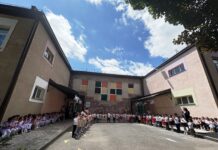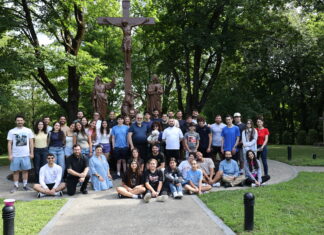By Olya Yordanyan
Special to the Mirror-Spectator
Human Rights Activist Prendergast Brings Genocide Prevention Vision to Cambridge
CAMBRIDGE, Mass. — Human rights activist and best-selling author John Prendergast was the featured speaker at Holy Trinity Armenian Church on May 12. The talk was part of the Dr. Michael and Joyce Kolligian Distinguished Speakers Series.
Prendergast, who is the founding president of the Enough Project, an initiative aiming to end genocides, and board member of Not On Our Watch — a charity started by actors George Clooney, Brad Pitt, Matt Damon and Don Cheadle — contributed to the launch of Aurora Prize for Awakening Humanity. He is currently strategic consultant to the Aurora Prize.
The Aurora Prize, part of the 100 Lives organization, this past month gave out its inaugural prize to Marguerite Barankitse from Burundi.







